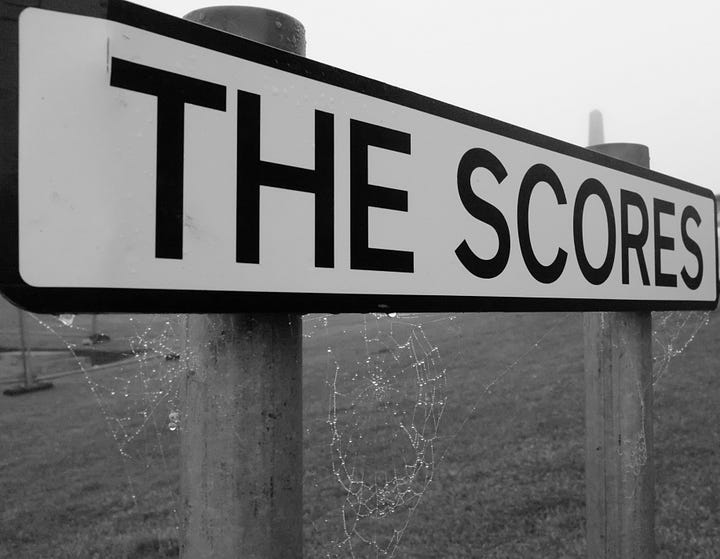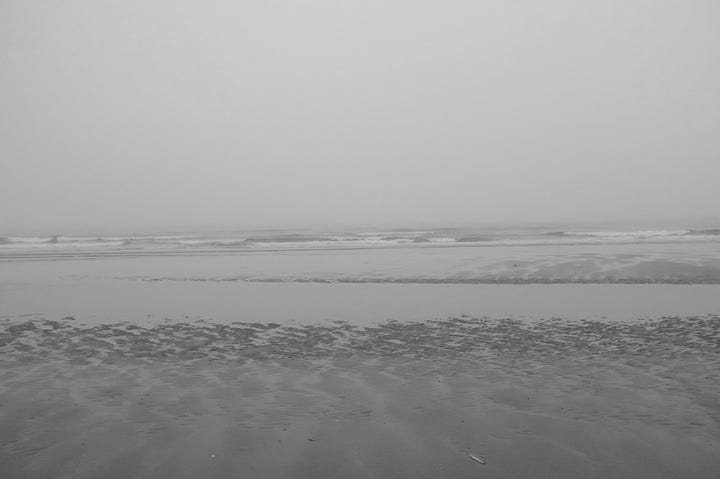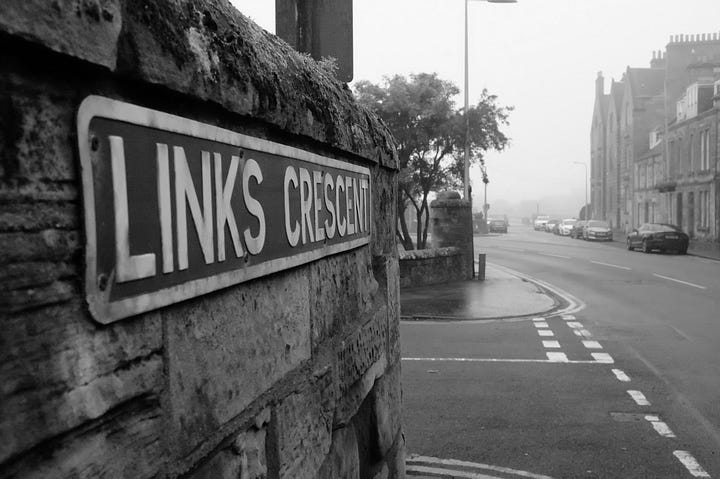Pitchmarks #64 - 15th September 2024 - Highland Games
We are sat in the Links Clubhouse, Pam and I, having a spot of breakfast and peering through the vast windows at a dense haar that has engulfed the dunes. Swirling as it rises, this thick fog will first reveal dark clumps of gorse - the whins, as the locals call them - followed by some flags, and then small groups of people and dogs, shuffling across the land. By the time we have paid and are back out in the fresh air of this September morning, the eerie silence too will be lifting, and we will once again be able to pick out the gentle crash of the waves onto West Sands, and the various, familiar calls of the seabirds who gather across that glorious beach. The high-pitched whistle of the guillemot pierces the gap between the low growls of the razorbill, all under the watchful eye of a hundred herring gulls.
But before we move, Pam shares some images of the Braemar Games, from which she has recently travelled. It looks a spectacle - marching bands in full Highland regalia, the tossing of an extremely dangerous looking caber. There is at once something mysterious and confusing in this strange blend of tradition and absurdity that feels familiar, and when I am shown a short clip of a number of people racing along a track though their legs are encased in what looks like a potato sack, I am reduced to a spluttering laugh, and have to look back out the window, and away from this bizarre scene.
And then I am quiet, and as another familiar sound penetrates this building - of titanium compressing urethane as the first golfers drive into the unknown - I wonder if this is how we golfers are seen, too. As walking manifestations of the apparent meaninglessness of life. As tragic figures, chopping our way between hope to misery with every desperate, comical lunge; caught in golf’s eternal cycle of suffering.
I look around. Within 50 yards - not metres, of course - are people who have circumnavigated the globe to photograph themselves at the Home of Golf. Pam has flown from Boston for the umpteenth time, in love with Scotland as we all are to some degree; I have driven through one night to be here, and will do the reverse later, and though there is decent - actually superb - golf on each of our doorsteps, we’ll do this sort of thing over and over. And there are others milling around from distant shores - a pair of lean youngsters from Vancouver, four grinning ladies from just outside Tokyo, and one elderly couple from Stoke Mandeville, whose miniature Schnauzer seems the most sensible being among us. His name is “Jim”, in case you were wondering.
They mill around, these tourists, taking snaps of their staged smiles as the fog rolls inland, slowly drenching us. We are all waiting for the haar to lift, for the sun to burn it away, but the sun is not coming today and even if it did, no-one will be playing the Old Course - golf’s sacred ground, our equivalent of the Braemar Gathering - for it is Sunday. But the air is clearing, and more of these golfing nuts head out on other paths through the linksland. The New starts from here, though it is very old by now, and from just over there The Jubilee.
So we watch a few strike out, and while they are not exactly grappling with a vast sack tied around their waist, some have at least an equivalent style about them. There is, in the hopping desperation of the sack-racer, an absence of grace that you would imagine is non-transferable, but in the few minutes we stand observing the start of these four-hour rituals, there are moments of pure comedy and tragedy side by side. The uniforms are different - kilts replaced by lurid trousers in some cases, hessian sacks by long woollen socks in others - but there is something in the crazed look of each golfer that I recognise from those other Highland Games.
Plus a multitude of lunges and angry heaves, none of which bear any resemblance to the gentle practice swings that came before, or to the dozens of equally wild swipes that will follow. No longer can I hear the waves or the waders; instead, we’re drawn into an orchestral movement carved of groans and pleas. Almighty slaps, followed by almighty sighs. It is carnage, and yet everyone is smiling, in between the agony.
Many of us show a commitment that goes way beyond that of the sack-racer. After all, a new sack can’t be an astronomical expense, but modern golf clubs carry a price tag that will make your eyes water as surely as the wind that whips across the shore. Such new weapons come with a standard promises of lower scores, greater distance and an overall sense of contentedness, but we all know this honeymoon effect begins to wane just as the payment clears.
This is fool’s gold we have invested in, and the pro knows it and we know it. People used to claim that the average handicap hasn’t changed in decades despite all this technology, but of course we can no longer judge this, as no-one on this side of the pond has the slightest idea what their actual handicap is these days. A rant for another time, perhaps.
Then there are the lessons. We reach a nadir - what the addict would term “rock bottom” - and only at that point do we reluctantly invest in some expert tuition, though we have squandered premium golf balls throughout the west since the last appointment. Of course, nothing bar the price has changed since the last corrective session, including our complete inability to listen or take instruction, though we leave with hope in our heart after several collisions between ball and sweetspot. But all recollection of the simple cure dissolves overnight, and we are back in the depths of despair by the time we miss the third fairway.
These modern balls - which the rare freaks who can actually play this game use to denude golf’s masterpieces - only serve to propel us mortals further off-line, deeper into both trouble and dejection. A beloved figure in these parts, and perhaps golf’s finest exponent - Bobby Jones - described it as being “played on a five-inch course - the distance between your ears”, yet we are obsessed with distance, and spend hours inspecting the boundaries of the club’s property in three minute shifts.
We stroll around St Andrews for a while, and then Pam and I bid each other farewell, and I meet some other friends, and prepare to test this new hypothesis - that golf is as fundamentally ludicrous as the sack race. As the tourists mill around, we step upon the opening tee of The New, and I split the fairway with a drive that marks the beginning of a remarkable streak of one decent shot in a row. As the round goes on, I hit several more fairways, though they are often on a different hole (I find the first fairway twice, for example), and one even belongs to another golf course.
There are a few nice shots, interspersed between unexplained atrocities, and I try to let the feeling engendered by the tiny miracles sink in, but my mood barely changes in response to the last shot, for that isn’t really why I am here. I am walking with dear friends - people whose company I cherish and whose outlook and demeanour and kindness the world needs more of, and this tends to be the sort of person I find on golf courses, expressing the sort of qualities I’d quite like to find in myself.
So I’ve no idea what I scored - apart from a fluke birdie somewhere in the front nine; I can remember that clearly enough - but once again I am changed by this world of golf and by the people who inhabit it. It was a preposterous notion several hundred years ago to chase a little ball round a field, just as it was to climb into a sack and run, and deep time has done nothing to change that for either pursuit. Pam sends me the sack racing video later, and I laugh once again, for it confirms two things.
Firstly, that there is little real difference between these wobbling sprinters and us golfers. We are each spending our valuable slice of life on earth mired in the ridiculous, and will have great difficulty explaining why to ourselves or anyone else. But secondly, I realise that in such farce lies a need for humour, since on the face of it each pastime will otherwise be a tragic waste of time.
Driving home, as the muscles on my face ache from hours of smiles and laughter, I stumble across Jerry Seinfeld’s commencement speech to some swanky university, and towards the end he delivers a message that seems designed for sack-racers and hackers alike.
“Don’t lose your humour”, he says, for “it’s not an accessory. It’s your Stanley Cup water bottle on the brutal long hike of life. And humour is not just for stress relief or even just the simple fun of laughing, but for the true perspective of the silliness of all humans and all existence”.
Let’s pledge to remember this when our ball next bounces hard left into trouble. Onwards, if not always upwards.









